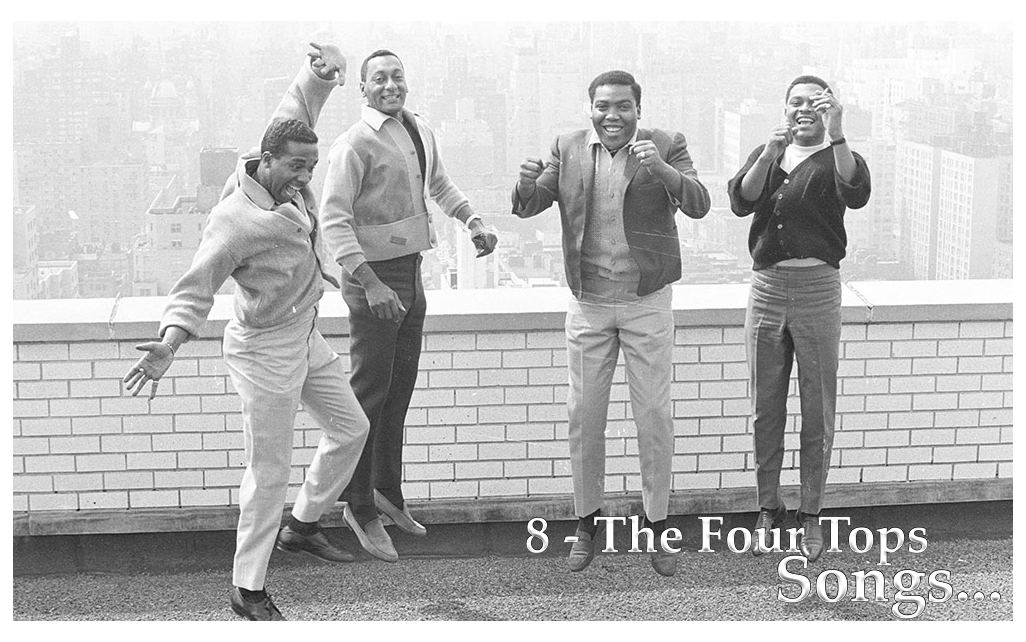(ThyBlackMan.com) When you talk about timeless soul music, The Four Tops deserve a permanent seat at the table. Their music, led by the deep, passionate voice of Levi Stubbs, captured the heart of Motown and the sound of an entire generation. Even decades later, these records still stir emotion, spark joy, and remind listeners what it means to feel every note. Below are eight songs that continue to define The Four Tops’ legacy — each one still resonant, still powerful, and still capable of lighting up a room.

1. “Still Water (Love)”
“Still Water (Love)” stands as a remarkable achievement in The Four Tops’ discography because it represents evolution — both musically and emotionally. By the time this song arrived in 1970, Motown was shifting, and so were its artists. The Four Tops weren’t just chasing hits anymore; they were making art. The song’s opening notes wash over the listener like morning sunlight on calm waters. Levi Stubbs doesn’t rush the lyrics — he lets them breathe, inviting the listener into a space of reflection. There’s beauty in its restraint, a soft kind of power that reveals how love’s strength often comes from tranquility, not turbulence.
The song’s genius lies in its duality. On one hand, it’s about love’s quiet assurance — that deep, steady current that keeps relationships alive. But on the other hand, it’s a metaphor for spiritual grounding. The Four Tops elevate love to something sacred, like a faith that endures. This was an evolution from their earlier, more explosive hits; here, they sounded like men who had lived, learned, and arrived at peace. Smokey Robinson’s songwriting mastery gives the lyrics a poetic edge, while Frank Wilson’s production turns that poetry into soul meditation.
What makes “Still Water (Love)” still relevant today is its emotional honesty. We live in an age where love songs often depend on drama and spectacle, but this one thrives on simplicity and trust. Its warmth feels timeless, echoing the idea that the truest emotions don’t age. Whether it’s playing through headphones during a sunset walk or filling a quiet room on a rainy evening, the song maintains its magic — not because of nostalgia, but because it taps into something universal and eternal.
Half a century later, “Still Water (Love)” feels like soul music’s version of a prayer. It’s about balance, patience, and the kind of devotion that doesn’t fade. For The Four Tops, it was a declaration that maturity in love — and in artistry — could be just as powerful as youthful passion.
2. “A Simple Game”
When “A Simple Game” was released, it surprised fans and critics alike. The collaboration between The Four Tops and Mike Pinder of The Moody Blues was not the typical Motown formula. It merged the emotional intensity of soul with the experimental textures of British rock — a daring move that could have gone wrong in lesser hands. Instead, The Four Tops turned it into a stirring masterpiece that showcased their artistic bravery and musical adaptability.
Levi Stubbs’ voice dominates the track like a storm moving through a valley. His phrasing is raw and human — he doesn’t just sing the lyrics, he inhabits them. When he sings about the games people play, it’s not a detached observation; it’s personal. You can hear pain, regret, and even wisdom layered within his tone. The other Tops — Duke Fakir, Lawrence Payton, and Obie Benson — provide that signature harmony cushion, softening the edges while keeping the song grounded in soul.
What’s particularly striking is how the song bridges two worlds. The orchestration — lush strings, complex arrangements, and dramatic dynamics — feels cinematic, while the groove and vocal fire remain distinctly Motown. It’s as if they took two genres that rarely met on equal footing and built a bridge made entirely of emotion. The result is timeless, transcending both labels and generations.
In today’s streaming landscape, where genres constantly blend, “A Simple Game” sounds surprisingly modern. It predicted the fusion culture that dominates music now — proof that The Four Tops were far ahead of their time. Listening today, the song feels like both a cry for understanding and a lesson in vulnerability. Life and love may seem simple, but as Stubbs reminds us through his anguished delivery, they are anything but.
3. “When She Was My Girl”
“When She Was My Girl” brought The Four Tops roaring back to life in the early 1980s. It wasn’t just a comeback single — it was a statement. After years of shifting musical landscapes and label changes, this song proved that real soul never loses relevance. It carried a mature energy, one that acknowledged the pain of lost love but also celebrated having loved deeply enough to remember.
Levi Stubbs’ performance is a masterclass in emotional control. His voice has aged beautifully here — there’s gravel and weariness, but it only adds to the authenticity. He doesn’t plead or beg; he reflects. The song’s narrative unfolds like a conversation with the past — bittersweet but dignified. The 1980s production, featuring smoother instrumentation and polished studio sound, complements rather than overshadows the group’s soulful roots. It’s a bridge between Motown’s golden age and a new musical world that valued sleekness and sophistication.
The beauty of “When She Was My Girl” is in its universality. Everyone has a “she” — or “he” — from their past, someone who shaped who they became. The song isn’t just about nostalgia; it’s about acceptance and gratitude. It reminds listeners that not every loss is tragic. Sometimes, it’s just part of growing up and moving forward with grace.
Decades later, it remains one of The Four Tops’ most enduring late-era hits. Younger R&B artists could learn from it — how to express heartbreak without melodrama, how to let sincerity guide the melody. “When She Was My Girl” endures because it captures the essence of adult love — flawed, reflective, but forever human. It’s a mature anthem that proves The Four Tops could evolve without ever losing their soul.
4. “Shake Me, Wake Me (When It’s Over)”
If “Still Water (Love)” was quiet introspection, “Shake Me, Wake Me (When It’s Over)” is emotional eruption. From the moment the horns blast in, you’re hit with urgency — a demand to feel, to move, to react. This is soul at its most theatrical and alive. Levi Stubbs channels heartbreak through the intensity of a preacher facing judgment day. Every syllable sounds like it costs him something. He doesn’t perform the song — he survives it.
The song’s gospel underpinnings give it fire. The call-and-response harmonies from the other Tops transform the heartbreak into a communal cry. You can imagine them performing it live, sweat dripping, voices echoing, audience clapping in sync with every beat. It’s not just heartbreak; it’s release. Few songs in any era have captured that kind of raw catharsis so vividly.
The instrumentation, handled by the Funk Brothers, is thunderous yet precise. The rhythm section churns like a heartbeat on the verge of breaking. Horns punctuate Stubbs’ cries like exclamation points of emotion. The entire production is a storm — and Stubbs is its center, standing strong even as love collapses around him. It’s musical drama at its highest level, but grounded in real feeling, not theatrics for their own sake.
In the modern landscape, “Shake Me, Wake Me” still feels explosive. Its DNA lives in countless performances — from R&B church runs to rock ballads where pain becomes power. It’s a timeless example of how soul music turns suffering into triumph. Listening today, you can’t help but feel what Stubbs felt — that aching disbelief when love vanishes. And yet, by the time the final note fades, you’re not left broken. You’re uplifted. That’s the miracle of The Four Tops — even in heartbreak, they made you believe in healing.
5. “Something About You”
“Something About You” embodies everything that made The Four Tops magical — it’s sophisticated yet accessible, joyful yet grounded, and built with the kind of polish that only Motown could produce. The track bursts to life with a rhythm that feels both confident and effortless, supported by the Funk Brothers’ irresistible instrumentation. From the first note, you feel uplifted, like being caught in the glow of new love — that intoxicating rush where everything seems possible.
Levi Stubbs approaches the lyrics with warmth and poise. He doesn’t over-sing or force emotion; instead, he lets his tone do the storytelling. His baritone carries the weight of experience, yet his phrasing is filled with youthful awe. The other Tops — Lawrence Payton, Obie Benson, and Duke Fakir — glide alongside him with layered harmonies that sparkle like sunlight on water. Their synergy is so tight it feels like one voice multiplied by emotion, wrapping the listener in sonic comfort.
The song’s brilliance lies in its emotional purity. There’s nothing cynical here, no hint of heartbreak or regret — just the unfiltered joy of discovering someone who changes your outlook on life. That simplicity is rare in modern love songs, where complexity and irony often overshadow sincerity. The lyric “There’s something about you, baby, that makes me feel so fine” might seem uncomplicated, but in its directness lies its universality. Everyone, at some point, has felt that spark — that unspoken magic.
Listening to “Something About You” today feels like a breath of fresh air. In a music landscape saturated with overproduction and calculated perfection, this song reminds us that soul thrives on feeling, not filters. It’s the sound of optimism set to rhythm — love without pretense, emotion without excess. Every spin reaffirms why The Four Tops’ catalog remains untouchable: it speaks to the heart’s most human truths with rhythm, warmth, and grace.
6. “Seven Rooms of Gloom”
“Seven Rooms of Gloom” may be one of the most hauntingly dramatic songs The Four Tops ever recorded. Released in 1967, it stands as a stark contrast to their typically romantic catalog, showing that soul music could explore darkness with the same depth as love. From the first pounding beat, it feels like a storm has broken loose. Levi Stubbs sings like a man trapped inside his own sorrow, each room of “gloom” representing another layer of heartbreak and despair.
The production by Holland–Dozier–Holland is nothing short of cinematic. The arrangement feels like something out of a psychological thriller — full of tension, shadow, and urgency. The strings swirl ominously, the horns pierce through the mix like lightning, and the percussion crashes like thunder against Stubbs’ pleading vocals. The energy builds with every verse, creating a sense of emotional claustrophobia that pulls the listener into the singer’s despair.
What makes the performance so striking is its theatricality. Stubbs doesn’t just sing about pain — he dramatizes it. His delivery borders on operatic, pushing soul into the realm of emotional theater. Yet, despite the intensity, it never feels overdone. The Tops’ harmonies ground him, offering brief flashes of light amid the darkness. It’s a delicate balance between chaos and control, despair and defiance.
Even today, “Seven Rooms of Gloom” feels ahead of its time. Its haunting atmosphere could fit comfortably in a contemporary neo-soul or cinematic pop playlist. The emotional rawness connects across decades — heartbreak is still heartbreak, loneliness still feels like a house too big and too quiet. The song remains a masterclass in translating emotional agony into sound. Listening now, you don’t just hear a man in pain; you feel like you’re right there with him, walking through those rooms of gloom, waiting for the light to return.
7. “It’s the Same Old Song”
Few tracks define The Four Tops’ legacy of bittersweet brilliance like “It’s the Same Old Song.” Written and produced by the unstoppable Motown trio Holland–Dozier–Holland, it’s a masterstroke of emotional contradiction — heartbreak wrapped in pure joy. The beat compels you to dance, but the lyrics cut deep. That tension, that duality, is the essence of Motown magic.
Levi Stubbs delivers the verses with a mix of resignation and resilience. He’s heartbroken, yes, but he refuses to drown in it. His voice trembles on the edges of sorrow yet never loses its strength. There’s something heroic in his restraint — the sound of a man determined to smile through pain. Meanwhile, the background vocals shimmer like sunlight breaking through rainclouds, turning tragedy into triumph.
The arrangement is deceptively simple but technically brilliant. The rhythm section, driven by James Jamerson’s agile bassline, gives the track its pulse. The tambourine keeps a heartbeat-like tempo while the horns add a layer of brightness that feels almost defiant. Everything in the mix is designed to sound effortless — yet it’s a perfectly calibrated storm of melody, rhythm, and feeling.
Half a century later, “It’s the Same Old Song” still resonates because it captures something timeless about human emotion. We’ve all danced to disguise pain. We’ve all smiled while remembering someone we’ve lost. The song’s genius lies in its honesty — that life goes on, even when your heart doesn’t want it to. Its influence echoes in generations of R&B and pop acts who learned how to turn sadness into something beautifully survivable. When The Four Tops sang, they weren’t just making music — they were teaching emotional endurance through sound.
8. “MacArthur Park (Live)”
The Four Tops’ live interpretation of “MacArthur Park” is one of those performances that reveals just how far their artistry could stretch. Originally a sweeping, metaphor-laden ballad by Jimmy Webb, the song was already known for its dramatic intensity. But in the hands of The Four Tops, it transforms into a soul epic — passionate, theatrical, and electrifyingly human.
Levi Stubbs commands the stage like a man on a mission. His voice carries the narrative’s heartbreak with operatic conviction, but unlike Richard Harris’s more distant version, Stubbs makes the pain personal. You feel every lyric as if it were lived experience. The line “Someone left the cake out in the rain” — often mocked in pop culture — becomes, in Stubbs’ delivery, a symbol of love gone irretrievably wrong. He takes what could have been melodrama and infuses it with real soul.
The live arrangement intensifies that emotion. The band doesn’t hold back — the brass section surges like a wave, the drums crash with purpose, and the harmonies from the other Tops echo through the performance like ghosts of lost love. The audience’s energy feeds into the delivery, making it less a concert moment and more an act of catharsis. Stubbs pushes his voice to its emotional edge, yet never loses control — that balance between vulnerability and command defines his genius.
Listening to “MacArthur Park (Live)” today is a reminder of what live soul performances used to be — raw, fearless, and unrepeatable. It’s the kind of performance that makes you believe in the transformative power of music. The song becomes more than a tale of heartbreak; it becomes a testament to endurance, to the human ability to find beauty in sadness. Even now, it feels alive, immediate, and deeply moving — proof that when The Four Tops took a song, they didn’t just sing it. They claimed it.
The Four Tops weren’t just another Motown act; they were storytellers, emotional translators, and performers who gave soul music its depth. Their catalog is filled with songs that still resonate today because they speak to timeless human experiences — love, loss, hope, and endurance. Whether you’re discovering them for the first time or returning to their classics, these eight tracks remind us that real soul never fades.

















Leave a Reply